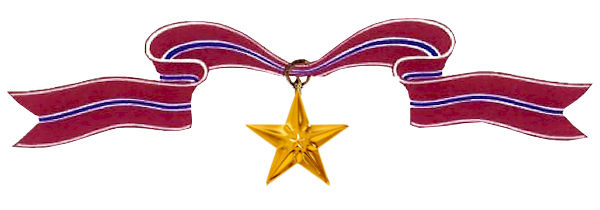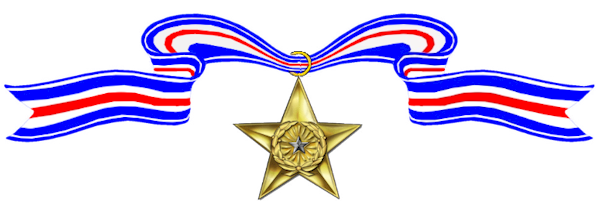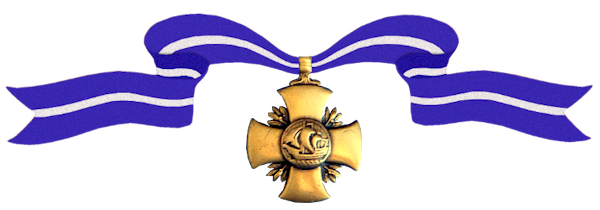A graduate of the University of Toledo, after serving in World War II, Korea, and Vietnam, Webb Sawyer retired as a U.S. Marine Corps Brigadier General on July 31, 1969.

Awards Received
-

Bronze Star Medal
-

Legion of Merit
-

Silver Star
-

Navy Cross
-

Silver Star
-

Legion of Merit
-

Silver Star
-
Bronze Star Medal

The President of the United States of America takes pleasure in presenting the Bronze Star Medal to Captain Webb Duane Sawyer (MCSN: 0-7847), United States Marine Corps, for meritorious achievement in action against the enemy on Saipan, Mariana Islands, from 16 June to 10 July 1944, as an Infantry Battalion Operations Officer. On the night of 15 June 1944, when the battalion executive officer became a casualty and was evacuated, Captain Sawyer assumed this duty in addition to his regular duty and performed both duties capably throughout the operation. His coordination of the efforts of the companies in the assault and defense was outstanding. His inspiring leadership and devotion to duty were in keeping with the highest traditions of the United States Naval Service.
-
Legion of Merit
Service:
United States Marine CorpsRank:
Brigadier GeneralAction Date:
April 13, 1968 – August 1, 1969
The President of the United States of America takes pleasure in presenting a Gold Star in lieu of a Second Award of the Legion of Merit to Brigadier General Webb Duane Sawyer (MCSN: 0-7847), United States Marine Corps, for exceptionally meritorious conduct in the performance of outstanding services to the Government of the United States as the Assistant Chief of Staff, G-3, Headquarters, U.S. Marine Corps, from 20 May to 20 July 1969, and as Deputy Assistant Chief of Staff, G-3, from 13 April 1968 to 19 May 1969 and from 21 July to 1 August 1969. During this period, Brigadier General Sawyer displayed outstanding judgment, executive skill, and professional competence in the development and implementation of Marine Corps tasks associated with the combat commitment in Southeast Asia. He improved and refined the Marine Corps program for exploiting professional knowledge gained from experience in Vietnam and incorporated it into Marine Corps doctrine and training. He instituted a mobilization reporting system designed to identify and eliminate potential mobilization problems. Displaying keen judgment and innovative skill, he revised current plans and instituted new means of ensuring that the Marine Corps will continue, by virtue of its structure and readiness, to meet its commitments in support of national policy in the coming years. Many dynamic and progressive improvements in Marine Corps training which will have significant and lasting benefits for the Marine Corps were implemented under Brigadier General Sawyer’s direction. Displaying a keen understanding of future Marine Corps needs, he sponsored basic requirements studies designed to determine overall integrated requirements in areas of tactical mobility and supporting arms. These studies will provide supporting rationale for future planning, programming, and budgetary actions. Superior performance of duties as typified above was the hallmark of Brigadier General Sawyer’s career in accomplishing broad and diverse tasks in both combat and other assignments, and highlighted the culmination of more than twenty-eight years of honorable and dedicated Marine Corps service. By his extraordinary devotion to duty and his outstanding professional abilities, Brigadier General Sawyer reflected great credit upon himself and the Marine Corps, and upheld the highest traditions of the United States Naval Service.
-
Silver Star
Service:
United States Marine CorpsRank:
MajorBatallion:
2d BattalionRegiment:
7th MarinesDivision:
1st Marine Division (Rein.)Action Date:
November 2 – 8, 1950
Headquarters, X Corps, General Orders No. 25 (February 10, 1951)The President of the United States of America, authorized by Act of Congress July 9, 1918, takes pleasure in presenting the Silver Star (Army Award) to Major Webb Duane Sawyer (MCSN: 0-7847), United States Marine Corps, for conspicuous gallantry and intrepidity in action against the enemy as Commanding Officer of the Second Battalion, Seventh Marines, FIRST Marine Division (Reinforced), in Korea, from 2 to 8 November 1950. On 2 November 1950, the enemy conducted a fierce night attack against the Second Battalion, Seventh Marines. Major Sawyer moved along the line, constantly closing gaps caused by the enemy action, reforming the defense to meet the changing situation and continually exposing himself to heavy enemy fire without regard for his own personal safety. Major Sawyer’s display of courage, leadership and initiative, coupled with his ability to coordinate the actions of his battalion, contributed in a high degree to the successful repulsion of the enemy.
-
Navy Cross
Service:
United States Marine CorpsRank:
Lieutenant ColonelBatallion:
1st BattalionRegiment:
7th MarinesDivision:
1st Marine Division (Rein.)Action Date:
April 22 – 25, 1951
Authority: Board of Awards: Serial 173 (March 27, 1952)The President of the United States of America takes pleasure in presenting the Navy Cross to Lieutenant Colonel Webb D. Sawyer (MCSN: 0-7847), United States Marine Corps, for extraordinary heroism in connection with military operations against an armed enemy of the United Nations while serving as Commanding Officer of the First Battalion, Seventh Marines, FIRST Marine Division (Reinforced), in action against enemy aggressor forces in the Republic of Korea from 22 to 25 April 1951. In the face of mounting enemy resistance on 22 April, Lieutenant Colonel Sawyer courageously moved among the foremost elements of his command, boldly exposing himself to intense hostile fire in order to direct his battalion in attacking and seizing strongly defended enemy positions. When a numerically superior enemy force launched a concerted night attack and penetrated an adjacent friendly unit, leaving his left flank completely exposed, he skillfully deployed his men to meet the threat before moving to a forward command post from which he could effectively observe and control the action. Remaining in this exposed position throughout the night and the following morning despite the imminent danger of enemy encirclement, he personally directed the repulse of repeated hostile thrusts and the containing of a dangerous penetration of the center of the line after bitter hand-to-hand fighting. When the enemy withdrew to the immediate front of the battalion shortly before daylight, simultaneously delivering a fierce volume of fire and sending a large force to envelop the penetrated unit on the left flank, he coolly supervised the evacuation of casualties and steadfastly refused to relinquish his exposed position until all had reached safety and he was ordered to assume new defensive positions. Selecting locations for defenses for the night after skillfully guiding the battalion over tortuous mountain trails to the assigned area, he conducted his unit in inflicting severe losses on the hostile force, continuing his engagement of the enemy throughout the night and remaining with the last elements of his command until the withdrawal of two friendly regiments had been covered. His inspiring leadership, aggressive determination and valiant devotion to duty in the face of constant attack and overwhelming odds were contributing factors in containing the hostile attack and in securing the vital left flank of the Division, thereby reflecting the highest credit upon Lieutenant Colonel Sawyer and the United States Naval Service.
-
Silver Star
Service:
United States Marine CorpsRank:
MajorBatallion:
2d BattalionRegiment:
7th MarinesDivision:
1st Marine Division (Rein.)Action Date:
December 8, 1950
General Orders No. 196The President of the United States of America, authorized by Act of Congress July 9, 1918, takes pleasure in presenting a Bronze Oak Leaf Cluster in lieu of a Second Award of the Silver Star (Army Award) to Major Webb Duane Sawyer (MCSN: 0-7847), United States Marine Corps, for conspicuous gallantry and intrepidity in action against the enemy while Commanding the Second Battalion, Seventh Marines, FIRST Marine Division (Reinforced), in Korea, on 8 December 1950. His battalion had been assigned as the advance guard of an infantry Regiment and was ordered to attack, seize and occupy the vital key terrain feature, Hill 1304, which was being strongly defended by the enemy. This hill controlled the critical passage through which the entrapped FIRST Marine Division had to move from Koto-ri to Chinhung-ni. In addition, his Battalion was to afford flank protection to the advance elements of the Regimental and Division vehicle train. The morning dawned in a driving snowstorm which limited visibility and ceiling to only a few feet throughout the entire day, and was punctuated by sub-zero temperature ranging to 22 degrees below zero. His battalion had become severely depleted from casualties and was virtually exhausted after more than eleven days of bitter fighting. During the attack of Hill 1304, which was being defended by a tenacious enemy from deeply entrenched and well camouflaged positions, seeing that one of his rifle companies was being outflanked by a numerically superior enemy, Major Sawyer, in spite of a painful foot wound received the previous day, traversed the tortuous terrain, to reach the dangerous flank. Constantly exposing himself to heavy enemy small arms, automatic weapons and sniper fire, he personally directed and led the attack of his depleted Battalion with such calculated precision and aggressiveness as to completely outmaneuver the enemy and in so doing, routed him from his defensive positions, inflicted innumerable casualties upon his foe and captured the vital objective. He then led elements of his battalion down a steep mountain pass for four miles to join friendly forces and open the road for the entrapped FIRST Marine Division. Major Sawyer’s devotion to duty, his aggressiveness, skill and heroic action served as a constant inspiration and example to all his officers and men.
-
Legion of Merit
Service:
United States Marine CorpsRank:
Lieutenant Colonel [then Major]Batallion:
1st BattalionRegiment:
7th MarinesDivision:
1st Marine Division (Rein.)Action Date:
December 15, 1950 – April 15, 1951
The President of the United States of America takes pleasure in presenting the Legion of Merit with Combat “V” to Lieutenant Colonel [then Major] Webb Duane Sawyer (MCSN: 0-7847), United States Marine Corps, for exceptionally meritorious conduct in the performance of outstanding services to the Government of the United States as Commanding Officer of the First Battalion, Seventh Marines, FIRST Marine Division (Reinforced), during the South Central Korean Campaign from 15 December 1950 to 15 April 1951. The Battalion under the command of Lieutenant Colonel Sawyer repeatedly and successfully engaged numerically superior North Korean forces, north of Pohang, later participated in numerous, successive actions against strong, determined and well-entrenched Chinese Communist forces in the attack from Wonju to Hongchon, and the drive from Chunchon across the 38th Parallel. By his exceptional professional knowledge and skill, his understanding of human values, his personal example of valor in the face of the enemy and his endurance under extremely adverse conditions of weather and terrain, Lieutenant Colonel Sawyer proved himself a peerless leader of fighting men and contributed materially to the success of the offensive operations then in progress. His skilled service and exemplary conduct throughout this period were in keeping with the highest traditions of the United States Naval Service. (Lieutenant Colonel Sawyer is authorized to wear the Combat “V”.)
-
Silver Star
Service:
United States Marine CorpsRank:
MajorBatallion:
2d BattalionRegiment:
7th MarinesDivision:
1st Marine Division (Rein.)Action Date:
December 6, 1950
The President of the United States of America takes pleasure in presenting a Gold Star in addition to a previously awarded Oak Leaf Cluster in lieu of a Third Award of the Silver Star to Major Webb Duane Sawyer (MCSN: 0-7847), United States Marine Corps, for conspicuous gallantry and intrepidity in action against the enemy while serving as Executive Officer of Second Battalion, Seventh Marines, FIRST Marine Division (Reinforced), in action against enemy aggressor forces in Korea, on 6 December 1950. When his battalion encountered fierce enemy resistance from strong hostile positions which dominated and blocked the road from Hagaru-ri to Koto-ri, Major Sawyer skillfully led elements of his group in an enveloping movement around the enemy’s left flank and, with brilliant leadership, successfully aided in countering and repelling the hostile attack. For twenty-two hours he voluntarily and continually remained exposed to a vicious hail of hostile fire and, though painfully wounded by mortar fire, steadfastly refused evacuation in order that he might assist in the direction and control of the fighting. By his valiant courage, daring initiative and staunch devotion to duty in the face of overwhelming odds, Major Sawyer contributed materially to the successful accomplishment of the battalion objective, thereby upholding the highest traditions of the United States Naval Service.

